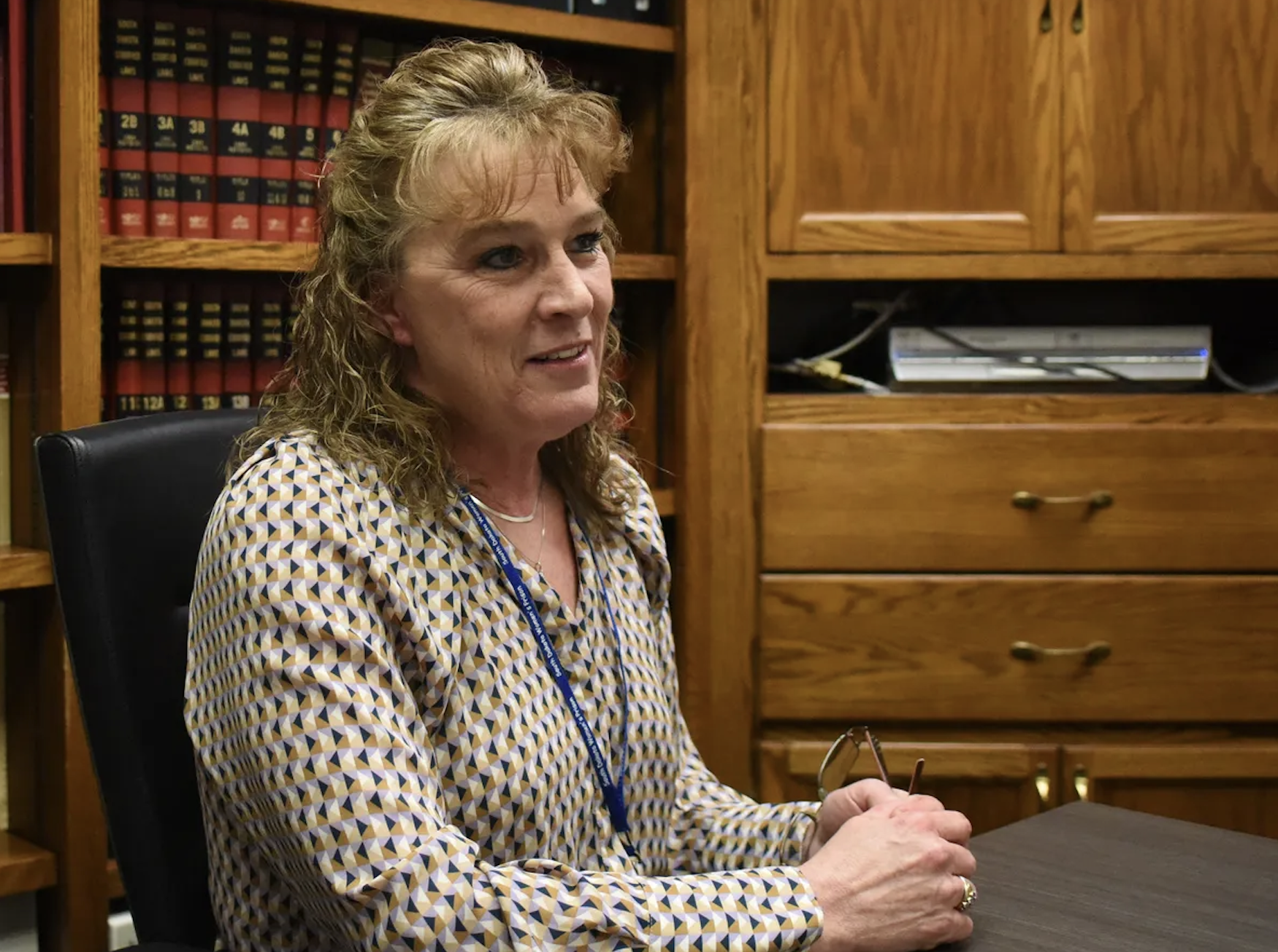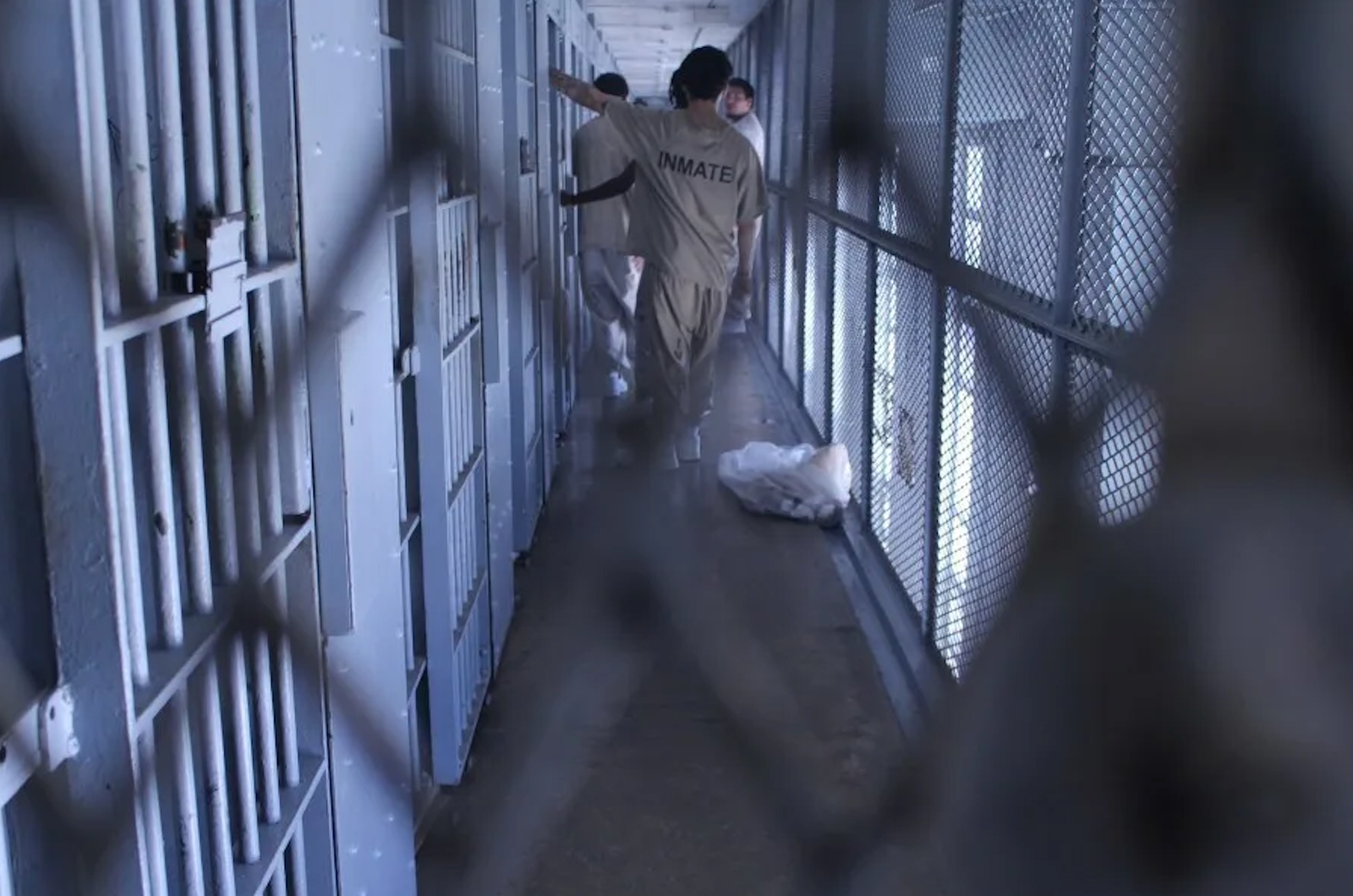PIERRE, S.D. – Gov. Larry Rhoden on Monday appointed an Iowa man with a lifetime of correctional leadership experience as the new South Dakota Department of Corrections secretary.
Nick Lamb replaces Kellie Wasko, whose resignation became effective Monday. Lamb has 31 years of corrections experience, having served in the Illinois, New Mexico and Iowa DOC, where he currently serves as deputy director of institutional operations, according to the governor's announcement.
“I am honored and humbled to have been selected as the next secretary of corrections by Gov. Rhoden. I also want to thank outgoing Secretary Kellie Wasko for her many years of service to the state of South Dakota and for the positive changes she initiated during her tenure,” Nick Lamb said in the statement.
Wasko tendered her resignation in the lead-up to the vote on a new prison in September, after 20 House members penned a letter critical of the DOC leadership.
The same day Wasko resigned, South Dakota House Speaker Jon Hansen called for her to be fired in a post on Facebook.
The measure authorizing the building of the $650 million prison in Sioux Falls narrowly passed, and Wasko’s resignation might have helped gain support from the House members critical of her leadership.
Opponents of the bill argued, among other things, that the state needed to address problems in the DOC before embarking on a major construction project. Unless the problems are addressed, the DOC will just transfer the same problems to a new facility, undermining its benefits.
Other former employees, including one who was warden, said the current state of DOC operations is abysmal and the DOC leadership is to blame.
Others defend the Wasko administration and said she’s being treated unfairly. The DOC disputes the employees’ claims and argues improvements are continuing.
Wasko wrote earlier this year that the hard-line approaches of the past don't work and the department needed to be reformed.
New correctional officers ‘fed to the wolves’
Jacob Gale spent a year as a correctional officer for the South Dakota Department of Corrections, working mostly at the Jameson Annex in Sioux Falls, a maximum-security facility. He thought working in the prisons would provide a promising career.
Instead, he encountered inadequate training, safety issues and a lack of support from his superiors, Gale told News Watch. He also said he was retaliated against when he spoke about the problems he saw, such as rampant drug use.
“It was like a pharmacy up there,” said Gale, who resigned from the DOC in September.
Gale said that his training to become a correctional officer lasted three weeks. He then spent three days with a correctional officer at the prison — what’s called “live time” — before he was working on the prison floor by himself.
“Three days, and then you’re just kind of fed to the wolves,” Gale said.
One day he was escorting an inmate from the showers back to his cell. Another inmate “jumped his cuffs,” meaning he slipped his hands out of them. The attacker then punched Gale in the head 10 to 15 times, he said.
“I got a pretty nasty scar on my head,” Gale said.
He said it was a random, unprovoked attack. Besides the scar, Gale said he experienced post-traumatic stress disorder afterward.
“I couldn't sleep for like three days. All I kept thinking about was the (shower) door that opened,” he said.
Correctional officer claims he faced retaliation for complaints
Gale asked for counseling, and the DOC granted him three free counseling sessions, which wasn’t enough. Correctional officers get little support for their problems from their superiors, he said.
Besides the lack of counseling following the attack, Gale said he communicated other issues, such as the regular use of methamphetamine, pills and a synthetic chemical called K2. He said he could often smell the drugs when he was walking the tiers. There was so much of it that officers were overwhelmed.
“I would confiscate it, do the evidence bags and turn it in. And it might get dealt with in six months when they have time to look at it,” Gale said.
The Division of Criminal Investigations has dealt with five suspected overdose deaths in the prison this year, according to the Attorney General's Office. As a result of those deaths, two defendants are scheduled to stand trial in January and another case is pending. Two more cases are still under investigation. The cases under investigation include an inmate, Kaleb Lukkes, who was found unresponsive in his cell on Sept. 23.
Gale said his complaints resulted in retaliation. He was written up on a number of occasions and even received a two-day suspension. He appealed the suspension with the human resources department and didn’t receive a response for a month. By that time he didn’t want to deal with it anymore, he said.
Gale said he also tried to appeal the other infractions he was written up for but couldn’t get anyone to look at body camera footage or other evidence that would dispute the infraction.
Another former correctional officer who didn’t want to be named corroborated many of the details Gale provided on the problems officers face working in South Dakota’s prisons. There is a lot of drug use, and the DOC cares little about officers on the floor, he said.
Former warden blames Wasko
Doug Weber, former chief warden and interim secretary for the DOC, told News Watch he’s heard similar stories from current correctional officers he’s spoken with. He blames Wasko’s leadership.
Weber had a 32-year career in the Department of Corrections, working his way up the ladder from correctional officer. Under the Wasko administration, the situation in the state’s prisons significantly deteriorated, he said.
“They’re much worse than I, who worked in the business for 32 years, could have imagined possible,” Weber said.
Weber is critical of Wasko’s decision to end “insolence” infractions. He said this led to a loss of control over the inmates. Allowing prisoners to be disrespectful to staff is like allowing high school students to be irreverent to teachers or administrators. It’s going to encourage the bad apples to push further, he said.

“Under my watch, if an officer told an inmate it's time to go lock up in your cell, the inmate did that. And if they didn't, there would be consequences,” Weber said.
He said not all inmates are going to be doing drugs, getting into fights and attacking officers. Most of them just want to keep quiet and serve their time. But there’s a small number that want to cause problems. And where they see a relaxing of the rules, they see an opportunity.
“Wasco has turned the prison over to the inmates,” Weber said.
By many metrics — including staff misconduct, inmate fatalities and overdoses — South Dakota prisons are worse than when Wasko took the helm in February 2022, he said.
According to DOC news releases, deaths in the South Dakota prisons averaged 11 per calendar year since former Gov. Kristi Noem appointed Wasko. This calendar year, there have been 19 so far.
Wasko: critics are ‘behind the times’
In an op-ed in The Dakota Scout in June, Wasko defended the policy ending punishment for insolence, arguing that the previous administrations were throwing prisoners into solitary confinement for swearing at corrections officers.
She compared this to giving life sentences to shoplifters and wrote that solitary confinement “dehumanizes.”
The change in policy is part of a rehabilitation-focused approach to corrections. Those who oppose relaxing this policy are “behind the times,” she wrote.
The DOC also disputed Weber’s and Gale’s claims.
“The Department of Corrections takes all threats to the health and safety of inmates and staff seriously.” – DOC
Inmates caught with drugs are removed from the population, placed under investigation and processed accordingly through the Division of Criminal Investigation. This was not the case in the past, including during Weber’s tenure, when the warden determined what to submit to law enforcement, according to the DOC.

“The Department of Corrections takes all threats to the health and safety of inmates and staff seriously,” the DOC told News Watch.
Staff entering the DOC receive four weeks of training, where they learn “self-defense techniques, the dynamics of incarcerated offenders, use of less lethal techniques, and numerous other proprietary courses that prepare them to work in a prison, which is an inherently dangerous environment,” according to the DOC.
Security staff vacancies have dropped from over 30% a few years ago to a 3%-6% vacancy rate today, the DOC said.
The DOC said that it has a zero-tolerance policy for retaliation of any staff, visitor or inmate reporting information to the administration. Any staff member has multiple agencies to reach out to, and claims of retaliation “misrepresent the way all of state government works and the multiple ways employees are protected,” the DOC said.
Under Wasko’s tenure, the DOC has stepped up investigations of illegal activity in the prisons, which have uncovered drug smuggling, gang activities and corruption among some staff. The department also wrote up 724 “insolence” incidents last year, so it continues to discipline those infractions.
The DOC pointed out that of the 19 deaths in the past fiscal year, 15 of those were by natural causes. And while the total number of offender deaths increased, the percentage of deaths as a share of the total prison population hasn’t changed dramatically under Wasko’s leadership.
Restorative justice
Sen. Jim Mehlhaff, R-Pierre, has been a defender of Wasko. Her critics have treated her unfairly, he told News Watch. As for the metrics that show worsening outcomes during her time at the DOC, “correlation doesn’t equal causation,” he said.
Wasko tried to implement restorative justice, and these policies take time to bear fruit, Mehlhaff said. During the time she was at the helm, inmates read about the negative comments from lawmakers as well as the reports of deaths and violence in the prison. This “firestorm” in the media could be what’s causing the increase in violence, he said.

The new prison, which Mehlhaff voted for, will expand programmatic space to reduce recidivism and improve behavior among the inmates, he said.
While Gale, the former correctional officer, is critical of the DOC leadership, he’s supportive of restorative justice policies. High turnover, which he blamed on low morale, is bringing in younger officers who don’t know how to get respect from the inmates, he said.
“I treated them (the inmates) like men. I tried to help them get through the night. And I’d say that’s one of the biggest problems with corrections. It’s a lot of younger kids that come in and they say, ‘Hey, I’m in charge. You listen to me.’ And that’s not how you go about getting respect from people,” Gale said.
Lessons from Utah’s new prison
Weber, the former chief warden, warns that a new prison won’t fix problems in the DOC operations.
He points to the experience in Utah, which spent over $1 billion on a new prison that opened in July 2022. A string of assaults at the new prison in 2023 prompted Utah Gov. Spencer Cox to launch an investigation, and these problems existed before the new prison, KUTV 2News reported.
Experts told the Utah news outlet that the cause of the assaults was chronic understaffing, mandatory overtime and a policy that had probation and parole officers taking shifts at the new prison.
It's not known if Lamb, the new Corrections secretary, will continue Wasko's policies or make significant changes, but Rhoden's announcement says Lamb will "ensure strong implementation of rehabilitation services that will reduce recidivism and keep our communities safe."
This story was produced by South Dakota News Watch, an independent, nonprofit organization. Read more stories and donate at sdnewswatch.org and sign up for an email to get stories when they're published. Contact statehouse investigative reporter Kevin Killough at kevin.killough@sdnewswatch.org.








